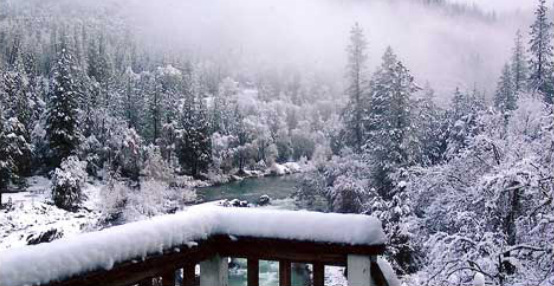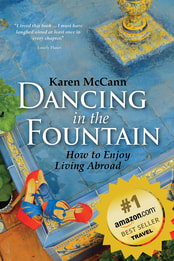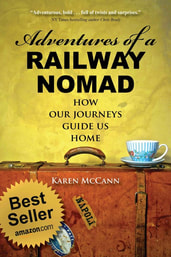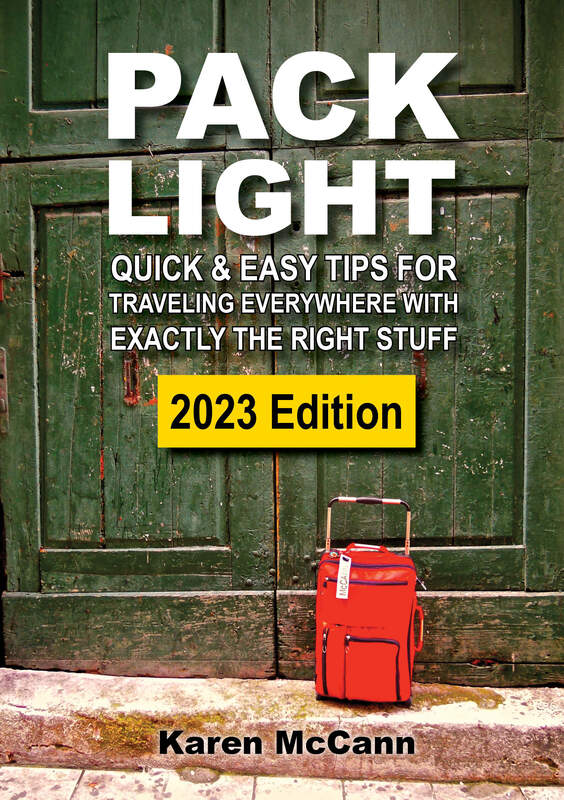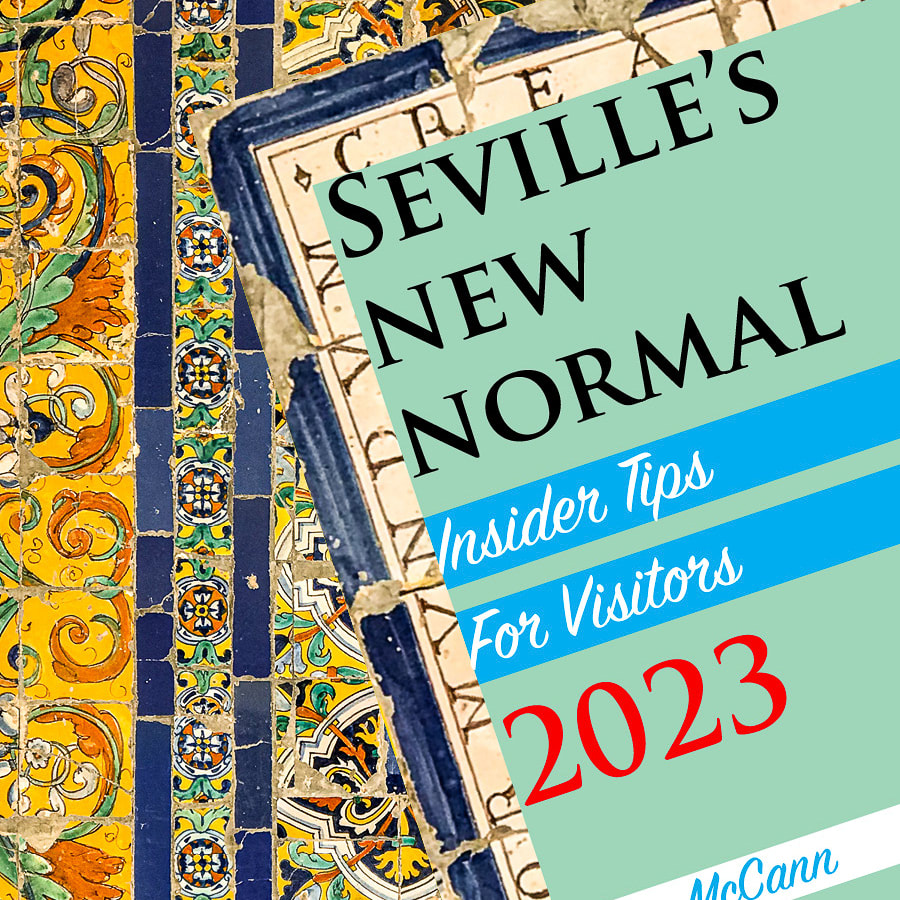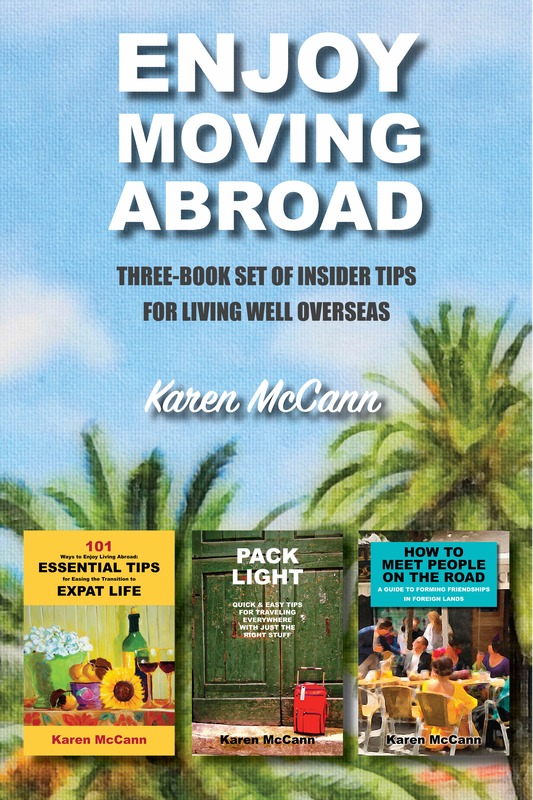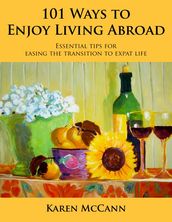 Stehen King defines "earworm" Stehen King defines "earworm" I was recently appalled to discover how many of the “new” words just appearing in the Oxford Dictionary are hacked-down versions of old favorites: apols (apologies), grats (congratulations), srsly (seriously), and so on. Is our language being hijacked by Twitter? But no, I was relieved to note that many of this year’s newbies were spelled out in full and are rich with meaning: buzzworthy, Oprah’s trademark aha moment, and digital detox for times when you need a vacation from your technology. And some old faves have earned new definitions. Earworm (originally a blight attacking corn) now also means, in the words of Stephen King, one of those “songs that burrow into your head and commence chewing your brains.” Clearly the English language isn’t in great peril if we’re still coining new words and usages like that. The great thing is, anyone can invent words. A couple of years ago, I was walking through the woods with some friends, and we started talking about how words get born. (Yes, I know, I am such a language geek.) Challenged to think of a new one, I came up with the phrase going spiral to mean something that gets quoted and bandied about among friends. Unlike going viral, which indicates something that rapidly enters widespread public awareness, going spiral means circulating around within a private group, such as the running jokes that last through a reunion weekend. Whenever I travel with certain friends, I know sooner or later someone will say, “I don’t know where I am but I don’t feel lost,” or “We’re very, very close,” to indicate the driver has absolutely no idea when, or even if, we will reach our destination. Going spiral gains a bit more momentum every time a friend uses the phrase in conversation, correspondence, or a comment on my blog or Facebook page, but I doubt you’ll see it in the Oxford Dictionary any time soon.  George Takei, up to new shenaniganzas George Takei, up to new shenaniganzas I was delighted to discover that I’m not the only one out there coming up with new words. Social media superstar and actor George Takei (you first knew him as Mr. Sulu on Star Trek) invites people to send him new words they’ve coined, and his friends have come up with some doozies. Shenaniganza: An extravaganza of shenanigans (from Anne-Marie Whisman Pine) Boobage (alternative to cleavage): “I like this dress, but it shows too much boobage” (from Christine Lathem) Hangry: hungry + angry (from Wendy Flick) Brilliant! I, for one, am inserting these words into my daily conversations as we speak. 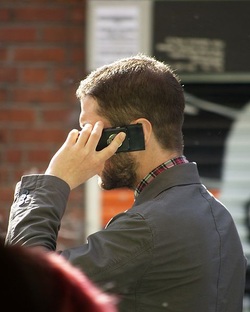 Cellodrama alert! (Photo by Tim Parkinson) Cellodrama alert! (Photo by Tim Parkinson) If you’ve got a new word that deserves a wider audience, now’s your chance to let it go spiral, maybe even viral. Post it here in the comments, and let us know what it means and how you’d use it in a sentence. They say the English language contains the largest, most cramazing and spiffylicious collection of words in the world, and I figure it’s up to all of us to keep it snizzo. I’ll leave you with another favorite new word from the George Takei collection: Cellodrama: One side of a drama played out in front of a group of people overhearing someone else’s phone call, (on a bus, train, etc), ie: “… aww, c’mon Rosie, I didn’t … she was kissing ME … no I wasn’t … no don’t be like that, we can work this out babe … Rosie? … No don’t say that baby … Rosie, ROSIE!?!” etc. (from Laen Deakin)
14 Comments
Contrary to popular belief, living abroad doesn’t require you to be wealthy, retired, or willing to spend years restoring a crumbling farmhouse with the help of semi-literate but wise and amusing locals. But if you do choose to become an expat, there are three things you will need to survive the general upheaval of the move and the inevitable social and linguistic pratfalls you’ll be taking in your new home. 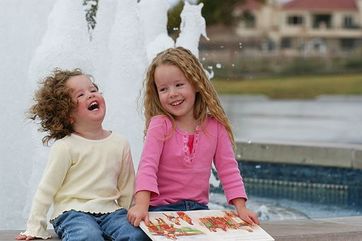 A belly laugh a day keeps the expat blues away. A belly laugh a day keeps the expat blues away. 1. A sense of humor. Every foreign language is studded with little trip wires, such as the Spanish word embarazada, which sounds so much like the English “embarrassed,” but in fact means “pregnant,” creating endless opportunities for misunderstandings and faux pas. Or there’s the common word huevos, literally “eggs” but often used as a slang word for testicles. You’ll want to be careful not to ask the guy at the farmers’ market whether he has huevos; he’ll inevitably reply “Yes, two big ones,” and everyone within earshot will snicker until you flee in confusion and find someplace else to buy your breakfast groceries. If you can laugh about it later, you'll find it's the best antidote to the mortification of the moment. 2. An adaptable attitude. Life simply works differently elsewhere, and I can tell you from personal experience that it's rarely helpful to exclaim, “But that’s not the way they do things in Cleveland!” Americans who visit Seville often attempt to maintain their usual hours, eating breakfast while everyone else is still sleeping, trying to go shopping and sightseeing before anything opens, eating lunch at noon and dinner at seven – hours when no Sevillano would dream of taking a meal – and retiring for the night just as everyone else is heading out for before-dinner drinks. Such visitors usually leave town wondering why everyone says Seville is so jolly, when they found it rather dull. 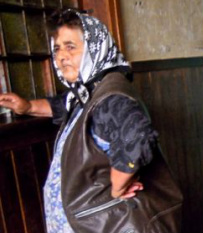 Romanian farmwoman at train station Romanian farmwoman at train station Adapting to some new customs – such as wine with lunch followed by a siesta – is delightfully easy. Others, such as spending an hour and a half on a train in which everyone is chain smoking, can be a bit more challenging. When this happened to me in rural Romania, I glanced around at my companions – tough country women and large, sinister-looking fellows in battered fedoras – and felt this was not the moment to enter into a debate about the health hazards of tobacco, the railroad’s clearly posted anti-smoking policy, or my personal breathing preferences. Even if my Romanian had been equal to such a conversation, I wasn’t entirely convinced it would have been in my best interests, as the pungent tobacco smoke provided a welcome counterpoint to the eye-watering scent of unwashed bodies. 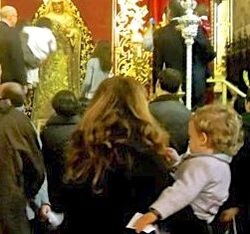 Palabrotas can happen anywhere. Palabrotas can happen anywhere. 3. Respect for other cultures. My friend Fiona just wrote a wonderful post on her Scribbler in Seville blog: Five things Spanish people say a lot (and what they mean). I especially loved the part describing how Sevillanos use profanity, which they call palabrotas (literally “big, ugly words”). I’ve often heard sweet old ladies and nice young parents addressing their toddlers using hair-raising palabrotas, words that in America would have passersby calling Child Protective Services or staging an intervention. But I have learned that in Spanish society, such language isn’t shockingly inappropriate but rather is used casually to underscore intimacy and affection. I’m just glad that, as a foreigner, I’m not expected to use those words, as I can never keep straight their degree of shock value, and have once or twice hideously overstepped the mark by mistake. Maintaining your sense of humor, an adaptable attitude, and respect for other cultures will help you navigate a wide range of situations when you’re in unfamiliar territory. In her post, Fiona captures the richness and sheer lunacy of living in a world where beer isn’t alcohol, ham isn’t meat, and everyone’s mother makes the best gazpacho ever. And isn’t that really why we travel and live abroad – to be able to view the world through different eyes? 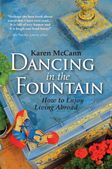 Want more about the joys, challenges, and outright lunacy of expat life? Check out my book Dancing in the Fountain: How to Enjoy Living Abroad. "I loved this book," wrote Lonely Planet. "I must have laughed aloud at least once in every chapter ... The advice in the book is terrific." Available from Amazon and e-book retailers worldwide. 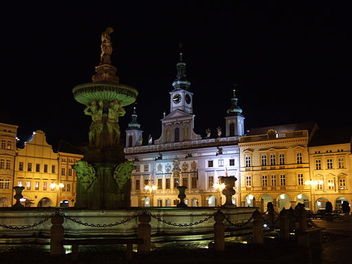 The Erratic Boulder is said to be near this fountain. (Photo: Ecelan) The Erratic Boulder is said to be near this fountain. (Photo: Ecelan) It’s a curious but well-known phenomenon among travelers that once you’ve been presented with a list of must-sees in the district, you feel almost honor-bound to pay each one of them a visit. Even if you’d never heard of, say, The Erratic Boulder of České Budějovice in the Czech Republic, suddenly you have the uncomfortable sensation that you’re letting down not only yourself but all of touristkind if you don’t go and pay homage to it. What’s The Erratic Boulder, you ask? A stone that marks the former site of a hangman’s scaffold; according to legend, if you pass over it after ten o’clock at night, you’ll be wandering the streets until dawn, unable to find your way home. It’s far from the most exciting monument in Europe, in the Czech Republic, or even in České Budějovice. But I am still faintly annoyed with myself for missing the chance to pass over it after ten and see whether I could make it safely back to my hotel. 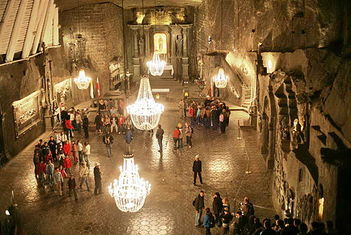 Wieliczka Salt Mine near Krakow. (Photo: Cezary p) Wieliczka Salt Mine near Krakow. (Photo: Cezary p) However, as last summer’s three-month train trip progressed, Rich and I became increasingly cavalier about neglecting monuments both great and small. In fact, we began to take pleasure in blowing off must-sees wherever we went. In Salzburg alone, we ignored Mozart’s birthplace, the castle, the cathedral, the palace of the Prince-Archbishops, various abbeys and churches, and Schloss Klessheim, a Baroque palace (now a casino) where Hitler used to hang out with Mussolini. We also skipped Prague’s Gates of Hell (said to be the actual entrance to Netherworld), Krakow’s famous salt mines, and all of the vampire graves in Transylvania. Instead, we reveled in the delightful sensation of being completely free to structure our days however we chose, consulting our preferences and whims rather than Wikitravel’s lists. We spent days simply wandering city streets, stopping at sidewalk cafés to sip espresso and watch that particular corner of the world offer itself to our interested gazes. We felt extraordinarily rich in that rarest of commodities: time. It was in Veliko Tarnovo, the old capital of Bulgaria, that I first heard the expressions “time rich” and “time poor” from an Australian who’d been on the road half a year. “Most people feel time poor,” he said one night over some eye-watering Romanian brandy. “They have the idea they have to jam as much as possible into each day because there are so few hours available to them. Doing less opens up your day. You realize that you really are time rich. It’s true luxury.”  Ever since that conversation, I have been attempting to embrace a “time rich” attitude. It isn’t easy. At the moment, I’m blogging, writing another book, corresponding with friends all over the world, staying active on social media, itching to get back to a neglected painting, expecting a houseguest, hosting three events in the next three days, and heading out soon to California – where my schedule looks even busier. However (pause for a deep breath) there are 8534 hours left in 2014. I will accomplish everything that’s really important to me, and let go of tasks that, like seeing The Erratic Boulder of České Budějovice, aren’t really crucial to my happiness. A friend once told me about a woman she knew who liked to go on holiday but hated to make arrangements, preferring to tag along on trips others had organized. “A lot of the time she didn’t even know what country she was in. For her, travel was just moving from one pub to another. ” I was rather cheered by this disclosure. Judged against this low bar, I am not doing too badly. I may not visit every must-see in Fodor’s, but I always know what country I’m in, and on a good day, I remember that I have all the time I need to enjoy it. In keeping with my new policy of not trying to cram in absolutely everything, I want to let you know that I may not be posting on this blog next week, as I'll be on the road. I'll be back with you as soon as time permits. 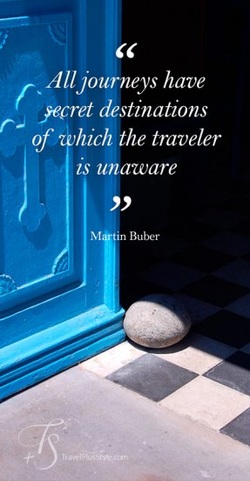 From Travel+Style's Best Travel Quotes From Travel+Style's Best Travel Quotes So yesterday I ran across this marvelous quote on Pinterest, from philosopher Martin Buber: “All journeys have secret destinations of which the traveler is unaware.” And what is our secret objective? I often think it’s an unconscious desire to have travel change us in ways we don’t see coming. Reading Buber’s words, I was suddenly reminded of the fall day nearly three decades ago that Rich and I discovered Washington, California. We’d been driving through the Sierras for hours, surrounded by nothing but trees, when we came across a signpost for a town deep in a remote valley. On impulse, we turned off the main road and began the steep decent through the pines. Eventually we arrived at a sign that read: “Washington Pop. 166 Elev. 2846’.” A minute later we rolled to a stop in front of the general store and got out. The store, warmed by a big, pot-bellied stove, held a wall of used paperbacks, rows of gallon jugs of cheap wine, and stacks of food in cans and jars. “We get snowed in every winter,” the proprietor told us. “The roads get completely blocked. So we’re stocking up now.” I stood there a while, imagining what it would be like to spend each winter cut off from the outside world. Growing up in California, I’d heard stories about old gold mining towns like this one, but I thought they’d vanished years ago. I saw myself tramping through three feet of snow to reach the general store, sitting around the stove with a cup of coffee, propping my feet up to thaw in the warmth of the crackling wood, sifting through a stack of paperbacks to choose my next one, passing the time of day with a random assortment of the other 165 residents. I pictured going home to a cottage where I’d have all the time I’d ever need to write and think and paint, or simply hibernate until spring rolled around. Rich and I have never been back to Washington. But we’ve often talked about what it would be like to pass a winter there, snuggled up in a cabin, hanging out at the general store with the town’s mountain men and women, never-let-go hippies, loners, artists, and other offbeat characters. Just knowing that town existed was somehow important to me, a strange haven for strange times, there if I ever needed that kind of refuge. This morning, when I told Rich about Buber’s quote and how it made me think of Washington, he said, “I wonder what it’s like now.” I pictured the hideous changes I’d seen in other California small towns: the old dirt road transformed into a highway lined with fast food restaurants and gas stations, a cluster of chain stores around the main square, big box megastores a few miles down the road. “I don’t think I want to know,” I said. But it was too late. Rich and Google had found the town. I was astonished and tremendously relieved to discover that, so far as I can tell, it hasn’t changed much. The population has grown to 185. They have Internet connection. But in the ways that matter, Washington still seems to be the land that time forgot. Here’s Su DeCorte, who owns the town’s hotel, talking about finding gold, and about a biker called “Space” and other “manly men” seeing a ghost on the third floor of her hotel. Would I really like to live in Washington, CA? Maybe not. But it is comforting to know that if I ever should want to leave the modern world and go back to the 1960s, or even the 1860s, it’s still there waiting for me, with a pot-bellied stove, a wall of paperbacks, and enough wine to get through the winter.
|
This blog is a promotion-free zone.
As my regular readers know, I never get free or discounted goods or services for mentioning anything on this blog (or anywhere else). I only write about things I find interesting and/or useful. I'm an American travel writer living in California and Seville, Spain. I travel the world seeking eccentric people, quirky places, and outrageously delicious food so I can have the fun of writing about them here.
My current project is OUT TO LUNCH IN SAN FRANCISCO. Don't miss out! SIGN UP HERE to be notified when I publish new posts. Planning a trip?
Use the search box below to find out about other places I've written about. Winner of the 2023 Firebird Book Award for Travel
#1 Amazon Bestseller in Tourist Destinations, Travel Tips, Gastronomy Essays, and Senior Travel
BLOG ARCHIVES
July 2024
CATEGORIES
All
|
